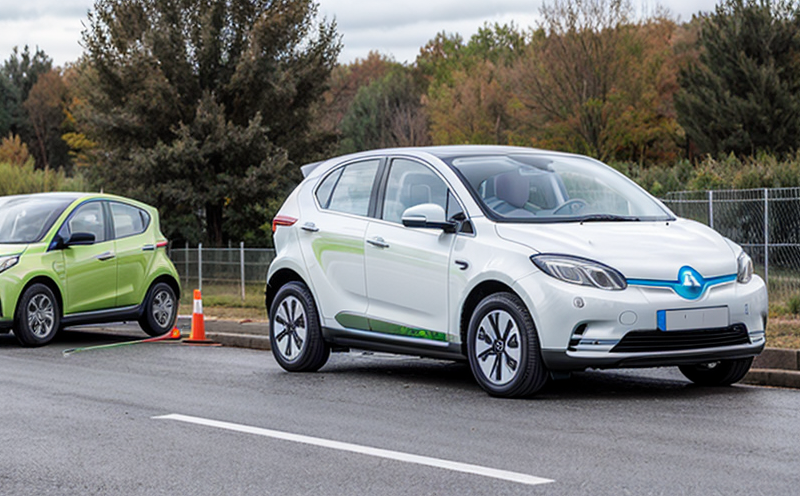IEC 62923-1 EV Battery Testing for Marine Applications
The International Electrotechnical Commission (IEC) Standard IEC 62923-1 sets forth comprehensive guidelines and test procedures to ensure the safety, performance, and reliability of electric vehicle (EV) batteries in marine environments. This standard is crucial for manufacturers, quality managers, compliance officers, and R&D engineers involved in the development and certification of EV battery systems intended for use in maritime applications.
The IEC 62923-1 standard covers a wide range of tests that are essential to verify the robustness and safety of EV batteries under various environmental conditions. These tests include but are not limited to high-pressure testing, salt spray exposure, vibration testing, and temperature cycling. The primary goal is to ensure that these batteries can withstand harsh marine environments without compromising on their performance or safety.
High-pressure testing simulates the effects of water depth in different parts of a ship, ensuring that the battery casing remains intact under pressure. Salt spray exposure tests assess how well the materials used in the battery can resist corrosion caused by saltwater. Vibration testing ensures that the internal components of the battery are securely fastened and will not come loose during transportation or operation at sea. Temperature cycling is designed to mimic the range of temperatures a marine EV might encounter, from hot tropical waters to cold Arctic regions.
The tests outlined in IEC 62923-1 are critical for ensuring that EV batteries meet stringent safety standards and can perform reliably over extended periods. By adhering to this standard, manufacturers can gain the trust of customers who demand high levels of performance and safety from their electric vehicles operating in marine environments.
The testing process begins with careful preparation of the battery specimen. This involves disassembling the battery into its component parts for specific tests such as internal resistance measurement or electrolyte analysis. Once prepared, the batteries undergo a series of rigorous tests designed to replicate real-world conditions. Each test is conducted using specialized equipment tailored to simulate the environmental factors that the battery might encounter in marine applications.
The results from these tests are meticulously recorded and analyzed by our team of experts who have extensive experience with IEC standards. Our laboratory uses state-of-the-art testing facilities equipped with cutting-edge instrumentation to ensure accurate and reliable test results. After completing all required tests, we provide comprehensive reports detailing the performance of each tested battery against the specified requirements.
Compliance with IEC 62923-1 not only ensures safety but also facilitates smoother regulatory processes for manufacturers wishing to enter new markets or expand their existing ones. It helps build customer confidence and trust in the quality and reliability of EV batteries used in marine applications.
Industry Applications
| Application Area | Description |
|---|---|
| Marine Electric Vehicles (EVs) | Batteries used in electric ferries, yachts, and other water-based EVs must comply with IEC 62923-1 to ensure they can operate safely and reliably. |
| Hybrid Ships | For hybrid propulsion systems where batteries play a crucial role, compliance ensures that the battery component meets all safety and performance criteria necessary for safe operation in marine environments. |
- Battery packs installed in ferries to reduce fuel consumption and emissions.
- Backup power supplies on yachts to maintain critical systems during extended voyages.
- Hybrid propulsion systems that use batteries for short-range electric operation before switching to diesel engines for longer journeys.
Quality and Reliability Assurance
- Conformance testing ensures the battery meets all specified performance criteria laid out in IEC 62923-1.
- Failure analysis helps identify any issues that may arise during testing so they can be addressed before mass production begins.
- High-pressure testing simulates water depth conditions to ensure the battery casing remains intact.
- Salt spray exposure tests assess material resistance to corrosion caused by saltwater.
- Vibration testing ensures secure internal component fastening during transportation and operation at sea.
The process of quality assurance is ongoing, involving regular reviews and updates based on feedback from our clients and advancements in technology. This approach guarantees that we are always providing the highest level of service and support to our customers.
Customer Impact and Satisfaction
By offering IEC 62923-1 EV battery testing services, we help our clients achieve regulatory compliance while enhancing their reputation among consumers who value safety and reliability in marine applications. Our customers benefit from increased market access opportunities as they can confidently introduce their products into new markets where stringent standards apply.
We understand that every customer has unique needs, which is why we tailor our services to meet those specific requirements. Whether you need assistance with preparation of specimens or interpretation of test results, our experienced team is here to provide guidance and support throughout the entire process.
Our focus on quality assurance and reliability ensures that your products not only comply with international standards but also exceed expectations in terms of performance and safety. We pride ourselves on delivering exceptional customer satisfaction through professionalism, expertise, and attention to detail.





